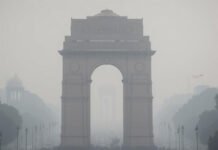
The Supreme Court of India has recently delivered a stern message to the Punjab and Haryana governments, highlighting the critical issue of stubble burning and its direct impact on Delhi’s air quality. The Supreme Court expressed disappointment over the nominal compensations recovered from farmers, emphasizing the need for stronger measures to curb this harmful practice. The court’s observations came during a hearing regarding the ongoing pollution crisis caused by agricultural stubble burning, which has drastically deteriorated the air quality in Northern India, particularly in Delhi.
Delhi’s Air Quality at Risk Due to Stubble Burning
The Supreme Court made it clear that the air quality in the Delhi-NCR region has been severely affected by the uncontrolled burning of agricultural residue, commonly known as stubble. Despite several warnings, the incidence of stubble burning continues, contributing significantly to air pollution levels. The Supreme Court stressed that this issue needs immediate action as the pollution levels in Delhi have reached alarming rates, especially during the winter months when smog blankets the city due to agricultural burning in the surrounding states.
Delhi’s Air Quality Index (AQI) often touches hazardous levels during the months of October and November, with stubble burning being identified as a major contributor to the pollution spike. The court emphasized that failure to implement concrete solutions to control the practice is worsening the public health crisis in Delhi and the surrounding areas.
Supreme Court’s Criticism of Air Quality Management Commission
A significant portion of the Supreme Court’s reprimand was directed at the Air Quality Management Commission (AQMC), the body responsible for overseeing pollution control efforts in the National Capital Region (NCR). The court expressed its dissatisfaction with the commission’s approach, citing a lack of urgency in addressing the stubble burning issue.
According to the court, the AQMC has not taken adequate steps to enforce the necessary measures outlined by the Supreme Court in previous orders. The commission’s inaction, coupled with its failure to convene a full quorum in critical meetings, was highlighted by the court as a serious oversight. In a meeting held on August 29, only five out of eleven members of the commission were present, and stubble burning was not even on the agenda, reflecting a severe lapse in leadership.
Call for Strict Action Under the Air Quality Management Commission Act
In its statement, the Supreme Court underscored the importance of imposing stricter penalties to deter stubble burning. The court remarked that unless farmers are held accountable through punitive action, the practice will continue unabated. The Air Quality Management Commission Act, which grants the commission powers to impose fines, file criminal charges, and even shut down polluting units, has not been used effectively, according to the court.
The Supreme Court demanded that the commission use the full scope of its authority to combat pollution, including registering criminal cases against violators. The court believes that mere fines are insufficient and that tougher legal consequences must follow if significant progress is to be made.
Stubble Burning Incidents on the Rise in Punjab and Haryana
Data presented to the Supreme Court indicated a surge in illegal stubble burning incidents between September 15 and September 30, with 129 violations reported in Punjab and Haryana. These states have been identified as the primary sources of stubble burning in India, and the court highlighted that despite these recurring incidents, minimal enforcement has been carried out.
The Supreme Court called for accountability from both state governments, asserting that stubble burning will continue unless there are tangible repercussions. As the problem intensifies each year, affecting millions of residents in Northern India, the court’s focus on this matter underscores the urgency for actionable solutions.
State Responses and the Supreme Court’s Reaction
During the proceedings, the Punjab government defended its stance, stating that it intends to take punitive measures only after providing alternative incentives to the farmers. According to the Advocate General of Punjab, over 1.4 lakh stubble-removal machines have been made available to farmers, but the state acknowledged that small farmers face challenges in accessing these machines due to the additional costs associated with fuel and drivers.
The Supreme Court did not find this argument convincing and pointed out that the state governments should do more to ensure that farmers use these alternatives. The court emphasized that waiting for perfect conditions to penalize farmers only allows the pollution problem to worsen, advocating instead for immediate and decisive action.
Environmental and Health Implications of Stubble Burning
Stubble burning is a significant source of air pollution, particularly in the Indo-Gangetic Plain, where millions of tons of crop residue are set ablaze each year. This process releases harmful pollutants such as PM2.5, carbon monoxide, methane, and volatile organic compounds (VOCs), which exacerbate respiratory and cardiovascular diseases. The World Health Organization (WHO) has classified air pollution as one of the leading environmental health risks, and in Delhi, where air quality deteriorates rapidly post-harvest season, residents are particularly vulnerable.
The adverse effects of stubble burning are not limited to human health; they also impact soil quality and contribute to climate change through the release of greenhouse gases. The Supreme Court emphasized that ignoring the environmental consequences of this practice will lead to long-term damage to both public health and the ecosystem.
Supreme Court’s Message: Time for Action, Not Words
The Supreme Court concluded its remarks by reiterating that unless the Air Quality Management Commission and state governments of Punjab and Haryana take decisive and coordinated action, the stubble burning crisis will remain unresolved. The court has set a clear expectation that the AQMC should use its authority to punish offenders under the Air Quality Management Commission Act, and that merely holding meetings without action is unacceptable.
The court’s next hearing, scheduled for October 16, will review the steps taken by the states and the commission to address the situation. As the pollution levels in Delhi-NCR continue to rise, the focus will remain on whether the concerned authorities will move beyond rhetoric and start implementing solutions on the ground.














